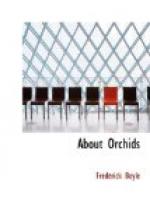The Burmese cases in hand just now are filled with Dendrobiums, crassinode and Wardianum, stowed in layers as close as possible, with D. Falconerii for packing material. A royal way of doing things indeed to substitute an orchid of value for shavings or moss, but mighty convenient and profitable. For that packing will be sent to the auction-rooms presently, and will be sold for no small proportion of the sum which its more delicate charge attains. We remark that the experienced persons who remove these precious sticks, layer by layer, perform their office gingerly. There is not much danger or unpleasantness in unpacking Dendrobes, compared with other genera, but ship-rats spring out occasionally and give an ugly bite; scorpions and centipedes have been known to harbour in the close roots of D. Falconerii; stinging ants are by no means improbable, nor huge spiders; while cockroaches of giant size, which should be killed, may be looked for with certainty. But men learn a habit of caution by experience of cargoes much more perilous. In those masses of Arundina bambusaefolia beneath the table yonder doubtless there are centipedes lurking, perhaps even scorpions, which have escaped the first inspection. Happily, these pests are dull, half-stupefied with the cold, when discovered, and no man here has been stung, circumspect as they are; but ants arrive as alert and as vicious as in their native realm. Distinctly they are no joke. To handle a consignment of Epidendrum bicornutum demands some nerve. A very ugly species loves its hollow bulbs, which, when disturbed, shoots out with lightning swiftness and nips the arm or hand so quickly that it can seldom be avoided. But the most awkward cases to deal with are those which contain Schomburghkia tibicinis. This superb orchid is so difficult to bloom that very few will attempt it; I have seen its flower but twice. Packers strongly approve the reluctance of the public to buy, since it restricts importation. The foreman has been laid up again and again. But they find pleasing curiosities also, tropic beetles, and insects, and cocoons. Dendrobiums in especial are favoured by moths; D. Wardianum is loaded with their webs, empty as a rule. Hitherto the men have preserved no chrysalids, but at this moment they have a few, of unknown species.
The farmer gets strange bits of advice sometimes, and strange offers of assistance. Talking of insects reminds him of a letter received last week. Here it is:—
SIRS,—I have heard that you are large growers of orchids; am I right in supposing that in their growth or production you are much troubled with some insect or caterpillar which retards or hinders their arrival at maturity, and that these insects or caterpillars can be destroyed by small snakes? I have tracts of land under my occupation, and if these small snakes can be of use in your culture of orchids you might write, as I could get you some on knowing what these might be worth to you.
Yours
truly
——




